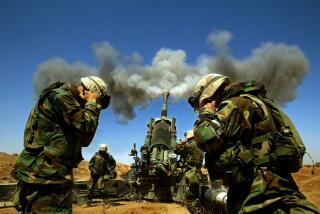Iraqi Lawmakers Line Up Behind Hussein
- Share via
BAGHDAD — Iraqi legislators urged the government Saturday to rescind its recognition of neighboring Kuwait and backed the leadership’s defiance of “no-fly” zones imposed by Western powers.
A draft resolution by the 250-member National Assembly also rubber-stamped President Saddam Hussein’s tough stance toward U.N. weapons inspections.
The legislators were expected to endorse the draft today and send it to the Revolutionary Command Council for ratification. It will become law when Hussein endorses it.
The draft resolution was circulated after fiery remarks by legislators, who lambasted U.N. weapons inspectors and the U.N. Security Council for not lifting sanctions that the United Nations imposed after Iraq’s 1990 invasion of Kuwait. The invasion sparked the 1991 Persian Gulf War.
“What is the use of cooperating with the Security Council at a time it has done nothing to ease the sanctions? It is essential that we stop dealing with its resolutions,” said legislator Usama Mahmoud.
He added that Iraq’s border with Kuwait is illegal. “Why do we recognize the borders? Why do we recognize Kuwait itself?”
Iraq’s parliament formally endorsed the 105-mile Kuwaiti-Iraqi border in 1994, dropping a territorial claim on the emirate. Lawmakers said that the parliament had agreed to recognize Kuwait within newly demarcated borders in the hope that U.N. sanctions would be lifted.
In Kuwait, British Prime Minister Tony Blair warned Iraq on Saturday not to attack its neighbors or allied forces in the region, saying the response to such action would be swift.
“What Saddam has to realize is that we are not going to allow him to threaten his neighborhood or threaten the stability of the region without taking action,” Blair said after arriving in Kuwait to visit British troops stationed there.
Kuwait was part of Iraq under the Ottoman Empire, which collapsed at the end of World War I. The British, who then took control of the region, gave Kuwait independence in 1961, triggering years of dispute over the border.
Speakers at the special session also called on Hussein to defy the no-fly zones in northern and southern Iraq.
The United States and Britain set up the zones to protect minority Kurds and Shiite Muslims who rebelled unsuccessfully against Baghdad after the Gulf War.
Iraqi pilots and antiaircraft batteries have been targeting U.S. and British warplanes over the zones since late December.
More to Read
Sign up for Essential California
The most important California stories and recommendations in your inbox every morning.
You may occasionally receive promotional content from the Los Angeles Times.










